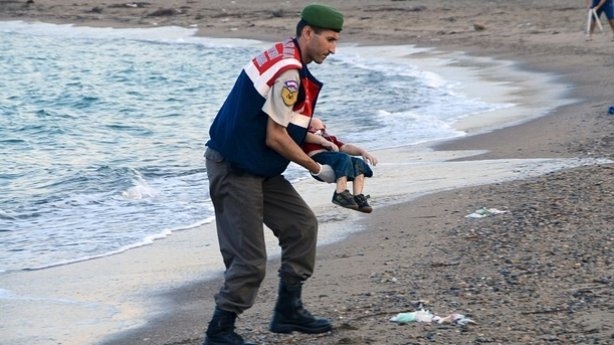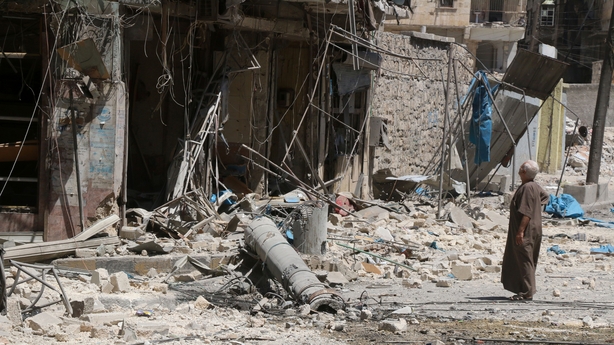An image of a boy pictured after being pulled from the rubble of a building hit by air strikes in Aleppo has been widely circulated on social media.
The boy - identified by doctors as five-year-old Omran Daqneesh – is seen wiping blood off his head as he sits alone in an ambulance.
Warning: This story contains images that some people may find disturbing - NOT SUITABLE FOR CHILDREN
Aleppo, split into rebel and government-controlled areas, has become the focus of fighting in Syria's five-year conflict.
Rebel-held areas are suffering heavy air strikes daily as pro-government forces try to retake territory lost to rebels two weeks ago in the southwest of Aleppo.
The video was shot yesterday in the rebel-held al-Qaterji neighbourhood of the city.
We need your consent to load this rte-player contentWe use rte-player to manage extra content that can set cookies on your device and collect data about your activity. Please review their details and accept them to load the content.Manage Preferences
It shows an aid worker carrying the little boy out of a building and placing him on a seat inside an ambulance, before rushing back out to the bombed-out scene.
Aleppo-based freelance photographer Mohammed Raslan Abu Sheikh, who was at the scene, said civilian rescuers and aid workers were elated as Omran was pulled out of the rubble alive with the rest of his family of six.
Last year, international sympathy for victims of Syria's war was heightened by a photo of a drowned three-year-old refugee from Syria, Aylan Kurdi, washed up on a Turkish tourist beach.

The image of Aylan, who died when a people smugglers' boat taking his family and other refugees to a nearby Greek island capsized, swept across social media and was retweeted thousands of times.
Meanwhile, aid convoys have not reached Syria's besieged areas with desperately needed food and medicine for the past month, the UN envoy to the war-ravaged country, Staffan de Mistura, said.
In protest at the failure of warring parties to allow aid to reach civilians, Mr de Mistura cut short the weekly meeting of the Geneva-based humanitarian taskforce, which is headed by the United States and Russia.
"Not one single convoy in one month has reached any of the humanitarian besieged areas," he told reporters, blaming relentless fighting.
Today's taskforce meeting lasted just eight minutes before it was "suspended", Mr de Mistura said, explaining that the move was symbolic and that the group would meet again next week.
The envoy re-issued the UN's call for a weekly 48-hour humanitarian pause in Aleppo, where an estimated 1.5 million civilians are trapped as fierce fighting rages between Syria President Bashar al-Assad's forces and rebels.
Aleppo, Syria's second city and former economic hub, has emerged as a top concern for the UN and aid agencies since regime troops seized control of the last supply route into rebel-held areas in mid-July.

Mr de Mistura said the 17 countries that make up the International Support Group for Syria, which sit on the humanitarian taskforce, would hold another meeting later today on the issue of a humanitarian pause in Aleppo.
Since the beginning of the year, the UN and its Red Cross partners have delivered aid to nearly 1.3 million Syrians living in areas defined as besieged or hard-to-reach.
But the movement of convoys has primarily been hampered by access restrictions imposed by Assad's government.
Deir Ezzor, which is partially controlled by the so-called Islamic State group, has continued to receive aid over the last month through World Food Programme air drops, Mr de Mistura said.
Four besieged areas - Madaya, Zabadani, Foah and Kafraya - have not been reached by a convoy in 110 days, the UN envoy added.
More than 290,000 people have been killed and more than half the population has been displaced since Syria's conflict erupted in March 2011 with anti-government protests that escalated into a brutal multi-front war.

